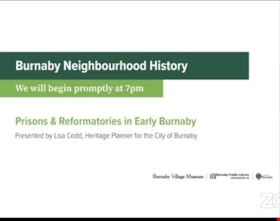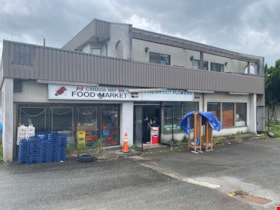Narrow Results By
Subject
- Accidents 1
- Advertising Medium - Signs and Signboards 1
- Agriculture 4
- Agriculture - Crops 1
- Agriculture - Farms 7
- Agriculture - Fruit and Berries 11
- Buildings - Civic - Museums 1
- Buildings - Commercial - Grocery Stores 3
- Buildings - Commercial - Restaurants 2
- Buildings - Commercial - Stores 6
- Buildings - Schools 2
- Celebrations 1
Roof Collapse at Metrotown Save-on-Foods
https://search.heritageburnaby.ca/link/museumdescription1166
- Repository
- Burnaby Village Museum
- Date
- April 1988
- Collection/Fonds
- Burnaby Village Museum Photograph collection
- Description Level
- Item
- Physical Description
- 1 photograph : col. 19.5 x 24.5 cm
- Scope and Content
- Aerial photograph of the aftermath of the Save-on-Foods roof collapse at Metrotown on April 23, 1988. The rooftop parking lot has caved into the store along with the cars parked in that section. Workmen and police officers in uniforms are at the parking lot.
- Repository
- Burnaby Village Museum
- Collection/Fonds
- Burnaby Village Museum Photograph collection
- Description Level
- Item
- Physical Description
- 1 photograph : col. 19.5 x 24.5 cm
- Scope and Content
- Aerial photograph of the aftermath of the Save-on-Foods roof collapse at Metrotown on April 23, 1988. The rooftop parking lot has caved into the store along with the cars parked in that section. Workmen and police officers in uniforms are at the parking lot.
- Geographic Access
- Kingsway
- Street Address
- 4800 Kingsway
- Accession Code
- BV992.51.1
- Access Restriction
- Restricted access
- Reproduction Restriction
- May be restricted by third party rights
- Date
- April 1988
- Media Type
- Photograph
- Historic Neighbourhood
- Central Park (Historic Neighbourhood)
- Planning Study Area
- Maywood Area
- Scan Resolution
- 600
- Scan Date
- 01-Jun-09
- Scale
- 100
- Photographer
- Hodge, Craig
- Notes
- Title based on contents of photograph
Images
Advertising flyer and order form for Chinese mandarin oranges
https://search.heritageburnaby.ca/link/museumdescription14878
- Repository
- Burnaby Village Museum
- Date
- 1979
- Collection/Fonds
- Julie Lee and Cecil Lee family fonds
- Description Level
- Item
- Physical Description
- 1 p.
- Scope and Content
- Item consists of a one page advertising flyer and order form to customers of W.H. Malkins "1979 Advertising program on Chinese Mandarin Oranges". The flyer includes the title in English and Chinese "Chinese Mandarin Oranges".
- Repository
- Burnaby Village Museum
- Collection/Fonds
- Julie Lee and Cecil Lee family fonds
- Description Level
- Item
- Physical Description
- 1 p.
- Scope and Content
- Item consists of a one page advertising flyer and order form to customers of W.H. Malkins "1979 Advertising program on Chinese Mandarin Oranges". The flyer includes the title in English and Chinese "Chinese Mandarin Oranges".
- Subjects
- Agriculture - Fruit and Berries
- Foods
- Documentary Artifacts - Leaflets
- Buildings - Commercial - Grocery Stores
- Accession Code
- BV019.6.107
- Access Restriction
- No restrictions
- Reproduction Restriction
- May be restricted by third party rights
- Date
- 1979
- Media Type
- Textual Record
- Scan Resolution
- 600
- Scan Date
- 3-Nov-2020
- Scale
- 100
- Notes
- Title based on content of item
- Item is part of a scrapbook album created by Cecil Lee
Images
California Satsuma mandarin oranges
https://search.heritageburnaby.ca/link/museumdescription14842
- Repository
- Burnaby Village Museum
- Date
- 15 Dec. 1978
- Collection/Fonds
- Julie Lee and Cecil Lee family fonds
- Description Level
- Item
- Physical Description
- 1 photograph : col. ; 13 x 8.7 cm
- Scope and Content
- Photograph of an arrangement of six mandarin oranges and a "Sunkist Mandarins" cardboard box with a handwritten label "California Satsuma - December 15, 1978" and a label benath "62 mm". The box and oranges are arranged in two rows of three on a surface covered with artificial turf (astroturf).
- Repository
- Burnaby Village Museum
- Collection/Fonds
- Julie Lee and Cecil Lee family fonds
- Description Level
- Item
- Physical Description
- 1 photograph : col. ; 13 x 8.7 cm
- Scope and Content
- Photograph of an arrangement of six mandarin oranges and a "Sunkist Mandarins" cardboard box with a handwritten label "California Satsuma - December 15, 1978" and a label benath "62 mm". The box and oranges are arranged in two rows of three on a surface covered with artificial turf (astroturf).
- Subjects
- Agriculture - Fruit and Berries
- Foods
- Accession Code
- BV019.6.71
- Access Restriction
- No restrictions
- Reproduction Restriction
- May be restricted by third party rights
- Date
- 15 Dec. 1978
- Media Type
- Photograph
- Scan Resolution
- 600
- Scan Date
- 20-Jan-2021
- Scale
- 100
- Notes
- Title based on contents of photograph
- Item is part of a scrapbook album created by Cecil Lee
Images
Canada Day Celebration at Burnaby Village Museum
https://search.heritageburnaby.ca/link/museumdescription3340
- Repository
- Burnaby Village Museum
- Date
- July 1, 2003
- Collection/Fonds
- Burnaby Village Museum Photograph collection
- Description Level
- Item
- Physical Description
- 1 photograph : col. composite ; 26 x 18 cm laser print
- Scope and Content
- Photograph is a composite of two images taken at the Canada Celebrations at the Burnaby Village Museum. Air cadets are marching with flag staffs as crowds stand by on either side in the first image and three women serve pieces of a large Canada Day cake in the second image.
- Repository
- Burnaby Village Museum
- Collection/Fonds
- Burnaby Village Museum Photograph collection
- Description Level
- Item
- Physical Description
- 1 photograph : col. composite ; 26 x 18 cm laser print
- Scope and Content
- Photograph is a composite of two images taken at the Canada Celebrations at the Burnaby Village Museum. Air cadets are marching with flag staffs as crowds stand by on either side in the first image and three women serve pieces of a large Canada Day cake in the second image.
- Subjects
- Celebrations
- Symbols - Flags
- Events - Parades
- Foods
- Names
- Burnaby Village Museum
- Accession Code
- BV004.35.2
- Access Restriction
- Restricted access
- Reproduction Restriction
- May be restricted by third party rights
- Date
- July 1, 2003
- Media Type
- Photograph
- Scan Resolution
- 600
- Scan Date
- 09-Jun-09
- Scale
- 100
- Photographer
- Low, Richard
- Notes
- Title based on contents of photograph
- Note in black ink on verso of photograph reads: "2003 Canada Day Celebration"
Images
China Month Contest
https://search.heritageburnaby.ca/link/museumdescription14875
- Repository
- Burnaby Village Museum
- Date
- 7 Nov. 1979
- Collection/Fonds
- Julie Lee and Cecil Lee family fonds
- Description Level
- Item
- Physical Description
- 1 p.
- Scope and Content
- Item consists of a one page flyer from Kelly Douglas and Company Limited titled "China Month Contest (includes handwritten Chinese characters above the english title) to "All Super Valu Stores" with the subject: "Chinese Mandarin Oranges Promotion".
- Repository
- Burnaby Village Museum
- Collection/Fonds
- Julie Lee and Cecil Lee family fonds
- Description Level
- Item
- Physical Description
- 1 p.
- Scope and Content
- Item consists of a one page flyer from Kelly Douglas and Company Limited titled "China Month Contest (includes handwritten Chinese characters above the english title) to "All Super Valu Stores" with the subject: "Chinese Mandarin Oranges Promotion".
- Subjects
- Agriculture - Fruit and Berries
- Foods
- Documentary Artifacts - Leaflets
- Buildings - Commercial - Grocery Stores
- Accession Code
- BV019.6.104
- Access Restriction
- No restrictions
- Reproduction Restriction
- May be restricted by third party rights
- Date
- 7 Nov. 1979
- Media Type
- Textual Record
- Scan Resolution
- 600
- Scan Date
- 3-Nov-2020
- Scale
- 100
- Notes
- Title based on content of item
- Item is part of a scrapbook album created by Cecil Lee
Images
Hudeh branch mandarin oranges
https://search.heritageburnaby.ca/link/museumdescription14837
- Repository
- Burnaby Village Museum
- Date
- 16 Dec. 1978
- Collection/Fonds
- Julie Lee and Cecil Lee family fonds
- Description Level
- Item
- Physical Description
- 1 photograph : col. ; 8.7 x 13 cm
- Scope and Content
- Photograph of an arrangement of six mandarin oranges identified with labels as "Hudeh Branch - December 16, 1978" with two different sizes 55 milimetres and 62 milimetres. Oranges are arranged on a sheet of cardboard in two rows of three with labels at the top and bottom.
- Repository
- Burnaby Village Museum
- Collection/Fonds
- Julie Lee and Cecil Lee family fonds
- Description Level
- Item
- Physical Description
- 1 photograph : col. ; 8.7 x 13 cm
- Scope and Content
- Photograph of an arrangement of six mandarin oranges identified with labels as "Hudeh Branch - December 16, 1978" with two different sizes 55 milimetres and 62 milimetres. Oranges are arranged on a sheet of cardboard in two rows of three with labels at the top and bottom.
- Subjects
- Agriculture - Fruit and Berries
- Foods
- Accession Code
- BV019.6.68
- Access Restriction
- No restrictions
- Reproduction Restriction
- May be restricted by third party rights
- Date
- 16 Dec. 1978
- Media Type
- Photograph
- Scan Resolution
- 600
- Scan Date
- 20-Jan-2021
- Scale
- 100
- Notes
- Title based on content of item
- Item is part of a scrapbook album created by Cecil Lee
Images
Hunan Branch mandarin oranges
https://search.heritageburnaby.ca/link/museumdescription14843
- Repository
- Burnaby Village Museum
- Date
- 15 Dec. 1978
- Collection/Fonds
- Julie Lee and Cecil Lee family fonds
- Description Level
- Item
- Physical Description
- 1 photograph : col. ; 8.7 x 13 cm
- Scope and Content
- Photograph of an arrangement of six mandarin oranges identified with labels as "Hunan Branch - December 15, 1978" with three different sizes measuring, 51 milimetres, 60 milimetres and 75 milimetres. Oranges are arranged in two rows of three on a sheet of cardboard on a background covered in artif…
- Repository
- Burnaby Village Museum
- Collection/Fonds
- Julie Lee and Cecil Lee family fonds
- Description Level
- Item
- Physical Description
- 1 photograph : col. ; 8.7 x 13 cm
- Scope and Content
- Photograph of an arrangement of six mandarin oranges identified with labels as "Hunan Branch - December 15, 1978" with three different sizes measuring, 51 milimetres, 60 milimetres and 75 milimetres. Oranges are arranged in two rows of three on a sheet of cardboard on a background covered in artificial turf with labels at the top and bottom. According the original album page that this photograph was taken from, these mandarins originated from a "Poor Crop Year" as a result of drought and water damage that occurred in 1976.
- Subjects
- Agriculture - Fruit and Berries
- Foods
- Accession Code
- BV019.6.72
- Access Restriction
- No restrictions
- Reproduction Restriction
- May be restricted by third party rights
- Date
- 15 Dec. 1978
- Media Type
- Photograph
- Scan Resolution
- 600
- Scan Date
- 20-Jan-2021
- Scale
- 100
- Notes
- Title based on contents of photograph
- Item is part of a scrapbook album created by Cecil Lee
Images
Hunan Branch mandarin oranges
https://search.heritageburnaby.ca/link/museumdescription14844
- Repository
- Burnaby Village Museum
- Date
- 15 Dec. 1978
- Collection/Fonds
- Julie Lee and Cecil Lee family fonds
- Description Level
- Item
- Physical Description
- 1 photograph : col. ; 13 x 8.7 cm
- Scope and Content
- Photograph of an arrangement of fourteen mandarin oranges identified with labels as "Hunan Branch - December 15, 1978" and two different sizes measuring, 51 milimetres and 75 milimetres. Oranges are arranged on a background covered in artificial turf with labels at the top. According the original …
- Repository
- Burnaby Village Museum
- Collection/Fonds
- Julie Lee and Cecil Lee family fonds
- Description Level
- Item
- Physical Description
- 1 photograph : col. ; 13 x 8.7 cm
- Scope and Content
- Photograph of an arrangement of fourteen mandarin oranges identified with labels as "Hunan Branch - December 15, 1978" and two different sizes measuring, 51 milimetres and 75 milimetres. Oranges are arranged on a background covered in artificial turf with labels at the top. According the original album page that this photograph was taken from, these mandarins originated from a "Poor Crop Year" as a result of drought and water damage that occurred in 1976.
- Subjects
- Agriculture - Fruit and Berries
- Foods
- Accession Code
- BV019.6.73
- Access Restriction
- No restrictions
- Reproduction Restriction
- May be restricted by third party rights
- Date
- 15 Dec. 1978
- Media Type
- Photograph
- Scan Resolution
- 600
- Scan Date
- 20-Jan-2021
- Scale
- 100
- Notes
- Title based on contents of photograph
- Item is part of a scrapbook album created by Cecil Lee
Images
Interview with Denise Fong by Rose Wu and Wei Yan Yeong
https://search.heritageburnaby.ca/link/museumdescription14276
- Repository
- Burnaby Village Museum
- Date
- 2020
- Collection/Fonds
- Burnaby Village Museum fonds
- Description Level
- Item
- Physical Description
- 1 sound recording (mp3) (00:60:38 min.)
- Scope and Content
- Item consists of an audio recording of a Zoom interview with Denise Fong conducted by Rose Wu and Wei Yan Yeong, in the Faculty of Land and Food Systems at UBC. The interview was conducted with Denise Fong as part of the students' research for their podcast "Where is your food from?". This podcast…
- Repository
- Burnaby Village Museum
- Collection/Fonds
- Burnaby Village Museum fonds
- Series
- UBC Partnership series
- Description Level
- Item
- Physical Description
- 1 sound recording (mp3) (00:60:38 min.)
- Material Details
- Interviewers: Rose Wu; Wei Yan Yeong Interviewee: Denise Fong Interview Date: September 2020 Total Number of tracks: 1 Total Length of all tracks: 00:60:38 Recording device: Zoom video communication platform Photograph info: Store front of Way Sang Yuen Wat Kee & Co in Victoria, B.C., 1975. BV017.7.191
- Scope and Content
- Item consists of an audio recording of a Zoom interview with Denise Fong conducted by Rose Wu and Wei Yan Yeong, in the Faculty of Land and Food Systems at UBC. The interview was conducted with Denise Fong as part of the students' research for their podcast "Where is your food from?". This podcast was part two in a series of three "Back to the Roots" podcasts about the history of Chinese-Canadian farming in Burnaby and the lower mainland. In this series the students connected their knowledge of food systems to their shared Chinese heritage in order to discover how Chinese Canadian history is rooted in their local food systems. "Where is your food from?" explores contemporary versus historical alternative food movements and how early Chinese farmers in the lower mainland had to be creative in their business tactics in order to survive in a local food system that discriminated against their race. 00:00 - 4:51 Denise Fong introduces herself and provides a summary of the work that she has done while working as a researcher on the Chinese Canadian History Research project for the Burnaby Village Museum. Denise explains how much of her research has focused on the history of Chinese Canadian market gardeners and green grocers and their presence in Burnaby. Denise tells of how many Chinese immigrants found it hard to find work due to racial discrimination which led many Chinese men to work in agriculture and farming. Her research has shown that many of the Chinese farms were located in the Big Bend area of Burnaby. 04:52 – 08:24 In this segment, Denise elaborates on the “truck” or “market” farming industry for Chinese farmers in Burnaby. Denise explains how “truck” farming was a mode for distributing produce from Chinese farms and some of the challenges the Chinese farmers faced. 08:25 – 14:10 In this segment Denise talks about peddling as another mode to distribute farm produce and how this was often dominated by Chinese Canadians since they were restricted from accessing other jobs. Denise explains how the Chinese peddlers would have their own routes with customers who depended on them to bring the produce to them. Denise provides an example of racial discrimination whereby a Burnaby Bylaw prevented people of Chinese descent from working for the city. 14:11 – 22: 39 In this segment, Denise describes how in the 1950s and 1960s, produce distribution networks for Chinese Canadian farmers in Burnaby expanded to larger stores and wholesalers including Woodward’s, Safeway in Burnaby, MacDonald’s Consolidated and Kelly Douglas. Denise provides specific examples of Burnaby families and tells the story of Chinese Canadian Cecil Lee, a produce buyer for Kelly Douglas. In the mid 1970s Lee, was asked to oversee the import of Chinese mandarin oranges into Canada and was responsible for the design of a new cardboard box to replace the wooden crates that held the mandarin oranges. 22:40 – 33:28 In this segment, Denise provides information on Chinese farming methods and practices that she gathered through her research. Information gathered from interviews, research papers and an article in Harrowsmith magazine suggest that many of the Big Bend farms in Burnaby relied on crop rotation, companion planting and intercropping along with traditional organic fertilizers that were available. Denise also tells of how Chinese farmers often relied on traditional methods that they brought from Southern China including the creation of raised beds to avoid damage due to flooding. Wei Yan comments that many of these traditional methods are being reintroduced as a new sustainable way of farming. Research done by Wei Yan found that when chemical fertilizers were introduced informational brochures included Chinese translations. 33:29 – 38:30 In this segment Rose and Wei Yan speak to Denise about the cultural demographic of farmers in the Big Bend area of Burnaby and what types of crops were grown. Denise comments that to her knowledge there were mostly Chinese farmers in this area but there were some European farmers as well. Produce that was grown on the farms was mostly market driven by the local consumers and it wasn’t until the 1970s that there was a bigger demand to grow Chinese vegetables to supply the growing Chinese population. Denise shares personal experience of what she learned after a visit to a local farm and the different methods that the farmer used for growing crops. The three discuss the importance of innovation and adaptability in growing techniques that Chinese farmers have used. 38:31 – 46:23 In this segment, Rose and Wei Yan speak to Denise about the discrimination barriers that Chinese farmers had to face. Denise speaks about discriminatory bylaws and regulations that targeted Chinese farmers including the Peddling tax. She tells of how this tax, persecution to peddlers and restrictions resulted in the emergence of a new industry of Chinese green grocers. Denise names Chinese trade organizations that were formed in response to the social and economic segregation and marginalization that Chinese farmers and retailers faced. Denise references research done by Natalie Gibb and Hannah Wittman from their article “Parallel Alternatives: Chinese-Canadian farmers and the Metro Vancouver local food movement” as well as research by Harry Con and Edgar Wickberg. Denise also provides information that she has gathered from Chinese farmers in Burnaby including the Yip family who were able to purchase land after World War II through the Veterans Land Act and how prior to World War II it was very difficult for Chinese immigrants to purchase land. 46:24 – 1:00:38 In this segment the group discusses how Chinese farmers have adapted in the market garden farm distribution system and the introduction of retail spaces on their farms as part of the new local food movement. Denise, Rose and Wei Yan reflect on how their interview with Denise Fong and research resources will support their podcast series and exhibits at Burnaby Village Museum.
- History
- Interviewer biographies: Rose Wu and Wei Yan Yeong are University of British Columbia students in the Faculty of Land and Food Systems and student interns at Burnaby Village Museum. Interviewee biography: Denise Fong is a historical researcher at Burnaby Village Museum. She has degrees in Anthropology (BA) and Archaeology (MA), and is completing her doctoral degree at UBC in Interdisciplinary Studies. Her primary research interests are in Chinese Canadian history and critical heritage studies. She is the co-curator of the Burnaby Village Museum “Across the Pacific” exhibition, and the Museum of Vancouver’s “A Seat at the Table – Chinese Immigration and British Columbia”.
- Creator
- Burnaby Village Museum
- Subjects
- Persons - Chinese Canadians
- Social Issues - Discrimination
- Social Issues - Racism
- Agriculture
- Agriculture - Crops
- Agriculture - Farms
- Gardens - Market Gardens
- Foods
- Names
- Fong, Denise
- Responsibility
- Wu, Rose
- Yeong, Wei Yan
- Accession Code
- BV020.28.2
- Access Restriction
- No restrictions
- Reproduction Restriction
- No known restrictions
- Date
- 2020
- Media Type
- Sound Recording
- Related Material
- BV020.28.4
- Notes
- Title based on contents of recording
- Item was originally recorded as an mp4 video and converted to an mp3 sound recording for public access on Heritage Burnaby. To access the video recording, contact Burnaby Village Museum.
- For recording of podcast "Where is your food from?" see BV020.28.4
Images
Audio Tracks
Interview with Denise Fong by Rose Wu and Wei Yan Yeong, 2020
Interview with Denise Fong by Rose Wu and Wei Yan Yeong, 2020
https://search.heritageburnaby.ca/media/hpo/_Data/_BVM_Sound_Recordings/Sound_Recordings/2020_0028_0002_002.mp3Interview with Lachman Singh Gill and Gill family members
https://search.heritageburnaby.ca/link/museumdescription19600
- Repository
- Burnaby Village Museum
- Date
- 2023 (interview content), interviewed 6 May 2023
- Collection/Fonds
- Burnaby Village Museum fonds
- Description Level
- Item
- Physical Description
- 2 sound recordings (wav) (124 min., 8 sec.) + 1 sound recording (m4a) 1:15:54
- Scope and Content
- Item consists of a recording of an oral history interview with Lachman Singh Gill and family members conducted by Burnaby Village Museum Registrar, Rajdeep. The first part of the interview was conducted with Lachman Singh Gill in Punjabi with some English and the second part of the interview (15 mi…
- Repository
- Burnaby Village Museum
- Collection/Fonds
- Burnaby Village Museum fonds
- Series
- Museum Oral Histories series
- Subseries
- Many Voices Project Interviews subseries
- Description Level
- Item
- Physical Description
- 2 sound recordings (wav) (124 min., 8 sec.) + 1 sound recording (m4a) 1:15:54
- Material Details
- Interviewer: Rajdeep Interviewees: Lachman Singh Gill and family members - Santokh Singh Gill, Mohinder Kaur Gill and Prem Kaur Gill Location of Interview: Gill family residence Interview Date: June 12, 2023 Total Number of tracks: 2 Total Length of all Tracks:124 min., 8 sec. Digital master recordings (wav) were recorded onto two separate audio tracks, edited and merged together and converted to mp3 for access on Heritage Burnaby
- Scope and Content
- Item consists of a recording of an oral history interview with Lachman Singh Gill and family members conducted by Burnaby Village Museum Registrar, Rajdeep. The first part of the interview was conducted with Lachman Singh Gill in Punjabi with some English and the second part of the interview (15 min.) was conducted in English with family members, Santokh Singh Gill, Mohinder Kaur Gill and Prem Kaur Gill. 00:00:00 - 00:05:35 This interview starts abruptly, and the interviewer was unable to introduce the interviewees and themself. There were also technical difficulties in the beginning, which led to the recording starting mid-sentence. Discussion begins with Lachman Singh Gill providing details on his spiritual practices and background. 00:05:35 - 00:13:38 Discussion continues with Lachman providing details on his birthplace in Punjab, his family home, family names and languages spoken while living in India (Punjabi and Urdu). Family members chime in to help with details. 00:13:39 - 00:18:00 Lachman Gill imparts information on his migration story from England to British Columbia and his experiences when he first came to England from India. Lachman shares his employment history in Vancouver and India. 00:18:01 - 00:23:34 Lachman talks about his marriage to Surjit Kaur (Ark) Gill in India in 1943 and shares the names of their seven children, including his youngest daughter Sarbjit who died tragically at a young age. Lachman shares the details of his daily routine at the age of 95 years old. 00:23:35 - 00:25:48 Lachman shares information on the Gurdwaras that he visits for prayers, weddings and events. 00:25:49 - 00:35:49 Lachman recalls his experience living in India at the time of Partition in 1947 including details on his family’s experiences of how they helped protect a Muslim family. 00:35:50 - 00:39:49 Lachman comments on his experiences of living in Burnaby from when he first arrived here. Lachman, Santokh, Prem and the interviewer recount the names and locations of gurdwaras in the lower mainland and how they’ve changed over time. 00:39:50 - 00:43:15 Lachman shares his employment history working in a foundry and driving a taxi. Santokh, Mohinder and Prem Gill provide information about Lachman’s wife Surjeet Kaur Gill. The group describes their family home in Burnaby which they've lived in since 1973 and their first home on Georgia Street in Burnaby. 00:43:16 - 00:49:19 Lachman, Mohinder and Santokh recall their experiences obtaining citizenship as British subjects and how they were able to buy a home in a year. Santokh Gill recalls how he and his brother took over his father’s taxi after he retired and later sold it for a profit. 00:49:20 - 01:04:19 Lachman describes in detail his daily routine as a 95 year old. The group shares some of their favourite types of roti and Lachman talks about using his hearing aid. The interviewer and group convey to Lachman how the information will be used. Lachman describes how his wife made oatmeal. 01:04:20 - 01:15:54 In this portion of the interview, Santokh and Prem Gill show the interviewer a book by Henry Bromley titled “Fire in the Blood: A History of British Columbia and Alberta Foundries”. The book was given to the Santokh when he was working at the foundry and contains photographs of Lachman Gill and the foundries they worked at. Santokh describes photographs within the book and the metal casting processes.
- History
- Interviewees' biographies: Lachman Singh Gill was born in 1928 in the village of Ferozepur near Lakhpur, Punjab. In 1943, Lachman married his wife Surjit Kaur Ark who was from the village of Malpur. Sometime after Partition in 1947, Lachman and his wife Surjeet immigrated to England. Lachman and Surjit had seven children, four sons and three daughters. Around 1973, Lachman's son, Santokh "Gurmail" Singh Gill sponsored his father and mother and they immigrated to Canada joining him and his family in Burnaby, British Columbia. After arriving in British Columbia, Lachman worked as a steel worker at a foundry and drove his own taxi. Lachman retired in his ffities and continues to live with his son and family in Burnaby. Santokh "Gurmail" Singh Gill was born in the District of Jalandhar in Punjab, India. Gurmail moved to England with his family in 1957 and immigrated to British Columbia in 1966. Gurmail married Mohinder Kaur Gill in England in 1968 and she immigrated to British Columbia from England soon after. Gurmail first lived with a cousin in Burnaby before purchasing a home of his own in Burnaby where he raised his family. Gurmail worked in the steel industry and was a member and treasurer of the CAIMAW before the union merged with the Canadian Auto Workers Union. Mohinder Kaur Gill was born in the Hoshiapur in Punjab, India. She married her husband Santokh "Gurmail" Singh Gill in England in 1968 and immigrated to Burnaby, British Columbia to join her husband. Mohinder and Gurmail Gill have four children, all born in Burnaby. Prem Kaur Gill was born in Burnaby in 1969 and is the eldest child of Santokh "Gurmail" Singh Gill and Mohinder Kaur Gill. Prem grew up and attended school in Burnaby. Interviewer biography: Rajdeep was born and raised in the Lower Mainland and is of Punjabi (South Asian) descent. She has an Associate of Arts degree in Asian Studies from Kwantlen Polytechnic University, a Bachelor of Arts (Hons.) in Anthropology from the University of British Columbia. She is a student in the Restoration of Natural Systems program at the University of Victoria. Rajdeep works at Simon Fraser University as a Program Assistant and as a researcher with the City of Burnaby. At Burnaby Village Museum, Rajdeep contributed to the exhibit “Truths Not Often Told: Being South Asian in Burnaby”.
- Creator
- Burnaby Village Museum
- Subjects
- Persons - South Asian Canadians
- Migration
- Foods
- Industries
- Persons - Seniors
- Religions - Sikhism
- Transportation - Taxicabs
- Names
- Gill, Lachman Singh
- Gill, Santokh "Gurmail" Singh
- Gill, Prem Kaur
- Gill, Mohinder Kaur
- Gill, Surjit Kaur Ark
- Gill, Sarbjit Kaur
- Responsibility
- Rajdeep
- Accession Code
- BV023.16.4
- Date
- 2023 (interview content), interviewed 6 May 2023
- Media Type
- Sound Recording
- Notes
- Title based on contents of item
- Transcript for master recordings available upon request - Contact Burnaby Village Museum
Images
Audio Tracks
Interview with Lachman Singh Gill and Gill family members, 2023 (interview content), interviewed 6 May 2023
Interview with Lachman Singh Gill and Gill family members, 2023 (interview content), interviewed 6 May 2023
https://search.heritageburnaby.ca/media/hpo/_Data/_BVM_Sound_Recordings/Oral_Histories/2023_0016_0004_003.m4aJapan fruit growers mandarin oranges
https://search.heritageburnaby.ca/link/museumdescription14839
- Repository
- Burnaby Village Museum
- Date
- 15 Dec. 1978
- Collection/Fonds
- Julie Lee and Cecil Lee family fonds
- Description Level
- Item
- Physical Description
- 1 photograph : col. ; 8.7 x 13 cm
- Scope and Content
- Photograph of an arrangement of six mandarin oranges identified with labels as "Japan Fruit Growers - December 15, 1978" with two different sizes measuring, 62 milimetres and 64 milimetres.Oranges are arranged on a sheet of cardboard in two rows of three with labels at the top and bottom.
- Repository
- Burnaby Village Museum
- Collection/Fonds
- Julie Lee and Cecil Lee family fonds
- Description Level
- Item
- Physical Description
- 1 photograph : col. ; 8.7 x 13 cm
- Scope and Content
- Photograph of an arrangement of six mandarin oranges identified with labels as "Japan Fruit Growers - December 15, 1978" with two different sizes measuring, 62 milimetres and 64 milimetres.Oranges are arranged on a sheet of cardboard in two rows of three with labels at the top and bottom.
- Subjects
- Agriculture - Fruit and Berries
- Foods
- Accession Code
- BV019.6.70
- Access Restriction
- No restrictions
- Reproduction Restriction
- May be restricted by third party rights
- Date
- 15 Dec. 1978
- Media Type
- Photograph
- Scan Resolution
- 600
- Scan Date
- 20-Jan-2021
- Scale
- 100
- Notes
- Title based on contents of photograph
- Item is part of a scrapbook album created by Cecil Lee
Images
Price change flyer
https://search.heritageburnaby.ca/link/museumdescription14881
- Repository
- Burnaby Village Museum
- Date
- 16 Nov. 1979
- Collection/Fonds
- Julie Lee and Cecil Lee family fonds
- Description Level
- Item
- Physical Description
- 1 p.
- Scope and Content
- Item consists of a flyer from the Produce Department of Kelly Douglas and Company Limited regarding the price changes for mandarin oranges in Vancouver and the Lower Mainland.
- Repository
- Burnaby Village Museum
- Collection/Fonds
- Julie Lee and Cecil Lee family fonds
- Description Level
- Item
- Physical Description
- 1 p.
- Scope and Content
- Item consists of a flyer from the Produce Department of Kelly Douglas and Company Limited regarding the price changes for mandarin oranges in Vancouver and the Lower Mainland.
- Subjects
- Agriculture - Fruit and Berries
- Foods
- Accession Code
- BV019.6.110
- Access Restriction
- No restrictions
- Reproduction Restriction
- May be restricted by third party rights
- Date
- 16 Nov. 1979
- Media Type
- Textual Record
- Scan Resolution
- 600
- Scan Date
- 10-Nov-2020
- Scale
- 100
- Notes
- Title based on content of item
- Item is part of a scrapbook album created by Cecil Lee
Images
Shanghai Branch Wenchow mandarin oranges
https://search.heritageburnaby.ca/link/museumdescription14838
- Repository
- Burnaby Village Museum
- Date
- 15 Dec. 1978
- Collection/Fonds
- Julie Lee and Cecil Lee family fonds
- Description Level
- Item
- Physical Description
- 1 photograph : col. ; 8.7 x 13 cm
- Scope and Content
- Photograph of an arrangement of six mandarin oranges identified with labels as "Shanghai Branch Wenchow - December 15, 1978" with two different sizes measuring, 56 milimetres and 76 milimetres.Oranges are arranged on a sheet of cardboard in two rows of three with labels at the top and bottom.
- Repository
- Burnaby Village Museum
- Collection/Fonds
- Julie Lee and Cecil Lee family fonds
- Description Level
- Item
- Physical Description
- 1 photograph : col. ; 8.7 x 13 cm
- Scope and Content
- Photograph of an arrangement of six mandarin oranges identified with labels as "Shanghai Branch Wenchow - December 15, 1978" with two different sizes measuring, 56 milimetres and 76 milimetres.Oranges are arranged on a sheet of cardboard in two rows of three with labels at the top and bottom.
- Subjects
- Agriculture - Fruit and Berries
- Foods
- Accession Code
- BV019.6.69
- Access Restriction
- No restrictions
- Reproduction Restriction
- May be restricted by third party rights
- Date
- 15 Dec. 1978
- Media Type
- Photograph
- Scan Resolution
- 600
- Scan Date
- 20-Jan-2021
- Scale
- 100
- Notes
- Title based on contents of photograph
- Item is part of a scrapbook album created by Cecil Lee
Images
West Coast Food Brokers Ltd. Bulletin
https://search.heritageburnaby.ca/link/museumdescription14852
- Repository
- Burnaby Village Museum
- Date
- 22 Oct. 1974
- Collection/Fonds
- Julie Lee and Cecil Lee family fonds
- Description Level
- Item
- Physical Description
- 1 p.
- Scope and Content
- Item consists of "Bulletin #354" from West Coast Food Brokers Ltd. titled "Chinese "Ponkan" Variety Mandarin Oranges" and dated October 22, 1974.
- Repository
- Burnaby Village Museum
- Collection/Fonds
- Julie Lee and Cecil Lee family fonds
- Description Level
- Item
- Physical Description
- 1 p.
- Scope and Content
- Item consists of "Bulletin #354" from West Coast Food Brokers Ltd. titled "Chinese "Ponkan" Variety Mandarin Oranges" and dated October 22, 1974.
- Accession Code
- BV019.6.81
- Access Restriction
- No restrictions
- Reproduction Restriction
- No known restrictions
- Date
- 22 Oct. 1974
- Media Type
- Textual Record
- Scan Resolution
- 600
- Scan Date
- 03-Nov-2020
- Scale
- 100
- Notes
- Title based on content of item
- Item is part of a scrapbook album created by Cecil Lee
Images
Interview with Dr. John Yang by Rose Wu and Wei Yan Yeong
https://search.heritageburnaby.ca/link/museumdescription14277
- Repository
- Burnaby Village Museum
- Date
- August 2020
- Collection/Fonds
- Burnaby Village Museum fonds
- Description Level
- Item
- Physical Description
- 1 video recording (mp4) (66 min., 57 sec.) : digital, col., sd., stereo
- Scope and Content
- Item consists of a video recording of a Zoom interview with Dr, John Yang conducted by Rose Wu and Wei Yan Yeong, UBC students in the UBC Faculty of Land and Food Systems. The interview was conducted with Dr. Yang as part of the students' research for "Chinese Herbalist Shops and TCM", part three i…
- Repository
- Burnaby Village Museum
- Collection/Fonds
- Burnaby Village Museum fonds
- Series
- UBC Partnership series
- Description Level
- Item
- Physical Description
- 1 video recording (mp4) (66 min., 57 sec.) : digital, col., sd., stereo
- Material Details
- Interviewers: Rose Wu; Wei Yan Yeong Interviewee: Dr. John Yang Interview Date: August 2020 Total Number of tracks: 1 Total Length of all tracks: 01:06:57 Recording Device: Zoom video communication platform
- Scope and Content
- Item consists of a video recording of a Zoom interview with Dr, John Yang conducted by Rose Wu and Wei Yan Yeong, UBC students in the UBC Faculty of Land and Food Systems. The interview was conducted with Dr. Yang as part of the students' research for "Chinese Herbalist Shops and TCM", part three in a series of "Back to the Roots" podcasts. The podcast series explores the history of Chinese-Canadian farming in Burnaby and the lower mainland. In this series the students connected their knowledge of food systems to their shared Chinese heritage in order to discover how Chinese Canadian history is rooted in their local food systems. The majority of the interview was conducted in english with occasional comments spoken in mandarin by Wei Yan Yeong and Dr. John Yang. 00:00 – 15:13 The video interview opens with Wei Yan Yeong providing a brief synopsis of the project that she is working on in partnership with Rose Wu. She explains to Dr. John Yang that the content from this interview will help inform podcast episode number three “Chinse Herbalist Shops and TCM”. Dr. Yang responds to questions asked by Wei Yan and Rose. Dr. Yang explains why he first came to Canada from China more than thirty years ago and provides information on his educational background. He describes how he first earned a degree in western medicine in China and became an assistant professor at a medical school before turning to study Traditional Chinese Medicine (TCM) by completing a PHD from Guangzhou University of Chinese Medicine. When he immigrated to Canada with his wife more than thirty years ago, he decided to continue to practice TCM . 15:14 – 21:53 In this segment of the interview, Rose Wu asks if he joined an existing TCM business or whether he started his own practice. Dr. Yang explains that he practiced on his own and that TCM wasn’t licensed in Canada until 1996. He further explains how Western medicine was the only regulated medical practice used in Canada and it took a long time to lobby the government to recognize the benefits of TCM and why it should be a licensed profession. 21:58 – 25:00 In this segment of the interview Dr. Yang speaks about his experience as a doctor of TCM in Burnaby, his role as the president of the Federation of Traditional Chinese Medicine Colleges of Canada and how they lobbied the government for more recognition and his professional work as a dean and clinical director of the Kwantlen Polytechnic University’s Traditional Chinese Medicine program. 27:36 – 47:07 In this segment Dr. Yang explains how Traditional Chinese Medicine is ingrained in the Chinese culture and part of daily life which is why many Chinese immigrants rely on TCM to protect their immune system. He explains how TCM is based on four different energies (cold, hot, warm and cool) and different from traditional western medicine. He provides examples of different energies from certain foods. 47:08 – 52:13 In this segment, Dr. Yang speaks about his experience as a practitioner of TCM in the treatment of patients, how many of his patients are not Chinese and how he treats many of his patients with acupuncture. Dr. Yang provides an example of a patient being treated with acupuncture for a frozen shoulder. 52:14 – 56:43 In this segment, Dr. Yang is asked if he also uses Western medicine. Dr. Yang shares his positive experiences treating fever with acupuncture and how growing up in China that there was no access to western medicine – no antibiotics or penicillin until the last 50 years or so. He explains that this is why Chinese people have always relied on TCM. 56:44 - 1:06:57 Dr. Yang provides information on the education required to become a registered acupuncturist and a licensed TCM practitioner. He explains that herbs used in TCM can be purchased from herbalist shops in Chinatown or you can purchase concentrations of the herbs directly from your TCM doctor. He clarifies how animal products that are restricted (including shark fins) are no longer included for treatments in TCM, all TCM herbs are regulated in Canada by the FDA whereas herbs that you buy in Chinatown are treated as food and not drugs.
- History
- Interviewer biographies: Rose Wu and Wei Yan Yeong are University of British Columbia students in the Faculty of Land and Food Systems and student interns at Burnaby Village Museum. Interviewee biography: Dr. John Yang is a chairperson and program director of Kwantlen Polytechnic University's Traditional Chinese Medicine program. Dr. John Yang graduated from Hainan University Medical School, Haikou, China. He received his TCM training at Hainan Provincial Hospital of TCM, Haikou, China and a PhD from Guangzhou University of Chinese Medicine, China. For the past 11 years, John has been the Dean and Clinic Director at the PCU College of Holistic Medicine, Burnaby. As an expert in the field, John has given many national and international presentations and lectures on TCM. Dr. Yang is the current Vice-President at the Association of Traditional Chinese Medicine and Acupuncture of British Columbia (ATCMA). He is also the Chair of the Academic/Educational Committee of ATCMA. Dr. Yang is the current President of the Federation of Traditional Chinese Medicine Colleges of Canada and a committee member on the Standards Council of Canada, Canadian Advisory Committees for International Organization for Standardization for TCM. John was elected as professional board member at the College of Traditional Chinese Medicine Practitioners and Acupuncturists of British Columbia (CTCMA). He was also a member of the Audit Team (Topic Specialist) for the Private Career Training Institution Agency of British Columbia (PCTIA), along with numerous past appointments to other TCM provincial, national and international committees.
- Subjects
- Persons - Chinese Canadians
- Social Issues - Discrimination
- Social Issues - Racism
- Public Services - Health Services
- Regulations
- Accession Code
- BV020.28.1
- Access Restriction
- Restricted access
- Reproduction Restriction
- May be restricted by third party rights
- Date
- August 2020
- Media Type
- Moving Images
- Related Material
- BV020.28.5
- Notes
- Title based on contents of video recording
- For recording of podcast "Chinese Herbalist Shops and TCM" - see BV020.28.5
- Contact Burnaby Village Museum to view content
Images
Interview with Julie Lee by Denise Fong February 6, 2020
https://search.heritageburnaby.ca/link/museumdescription12338
- Repository
- Burnaby Village Museum
- Date
- [1920-1992] (interview content), interviewed Feb. 6, 2020
- Collection/Fonds
- Burnaby Village Museum fonds
- Description Level
- Item
- Physical Description
- 1 sound recording (mp3) (00:53:46 min.)
- Scope and Content
- Recording consists of an interview with Julie Lee conducted by Burnaby Village Museum researcher Denise Fong. Julie Lee shares information about her mother, Suey Ying Jung's (Laura's) experiences growing up as a Chinese Canadian on a farm in Burnaby during the 1920s and 1930s. She also shares some …
- Repository
- Burnaby Village Museum
- Collection/Fonds
- Burnaby Village Museum fonds
- Series
- Museum Oral Histories series
- Subseries
- Chinese Canadians in Burnaby subseries
- Description Level
- Item
- Physical Description
- 1 sound recording (mp3) (00:53:46 min.)
- Material Details
- Interviewer: Denise Fong Interviewee: Julie Lee Location of Interview: Home of Julie and Cecil Lee Interview Date: February 6, 2020 Total Number of Tracks: 1 Total Length of all Tracks: 00:53:46
- Scope and Content
- Recording consists of an interview with Julie Lee conducted by Burnaby Village Museum researcher Denise Fong. Julie Lee shares information about her mother, Suey Ying Jung's (Laura's) experiences growing up as a Chinese Canadian on a farm in Burnaby during the 1920s and 1930s. She also shares some information about her father Puy Yuen Chan. 0:00- 01:47 Julie Lee provides background information on her families’ connection to Burnaby and conveys how her maternal grandparents farmed a five acre lot at Still Creek and Douglas Road. Her grandparents grew vegetable produce and operated a piggery at this location. Her mother, Suey Ying Jung (Laura) was the middle child between two older sisters, Maida and Annie and her two younger brothers Gordon and Harry. They were all born at home and educated at Edmonds Elementary School. 01:48- 11:47 Julie provides some background information about her mother, the friendships she made growing up, when she got married and places that she lived. She tells of her mother marrying in 1942 at age 30 years, moving to Fraser Mills and then onto Maillardville in 1958. There was easy access to the Interurban tram so her mother was able to have a social life with others in Vancouver’s Chinatown. She says that many of the only existing photographs of the family living on the farm at Still Creek and Douglas Road can be attributed to her mother’s friend Lil Mau [sic] who owned a camera. The farm was sold around 1949 when her grandparents moved to East Vancouver. While operating the farm, her grandparents only hired Chinese workers who spoke the same language and ate the same foods as them. Despite this, her grandparents made friends with the Collin’s family who assisted them in adjusting to the Canadian way of life. Julie tells that her mother’s sister Maida and brother in law lived with them at Fraser Mills. Her mother’s sister Maida had nine children so Julie’s mother helped her in raising them. 11:48 – 16:53 - Julie talks about racial prejudice towards the Chinese in Burnaby during the 1920s and 1930s. She says that for the most part, her mother’s family had a very insular life on the farm and mainly socialized only within the Chinese community. Julie tells of how she recently became aware of a memoir “The Way it Was”, written by Burnaby resident, Fannie Waplington. The memoir is held as part of the Burnaby Village Museum collection. In the memoir, Fannie Waplington tells of how she was forbidden from visiting Julie’s mother on their farm due to her ethnic background. Julie conveys that it seems like it was a missed friendship for both her mother and Fannie. 16:54 – 22:30 Julie describes what school life was like for her mother and what she may have done outside of school. Her mother attended Edmonds School in the 1920s up to Grade 7 or Grade 8. Julie explains that Asian girls were never offered the opportunity to pursue higher education while her mother’s brothers continued with their education attending Vancouver Technical School. Her mother continued to work on the farm until she was married cooking for workers and helping her mother. Outside of school, she may have helped with looking after nieces and nephews, played cards and mahjong. She says that her mother continued to play cards with her own children and was a skilled knitter into her 80s. 22:31 – 30: 53 Julie tells of what she knows about the Chinese workers on the farm and Fraser Mills and what they did on the weekends. She figures that many may have played card games to pass the time and at Fraser Mills gambling occurred. Fishing was a highlight for her father and she recalls him fishing sturgeon. Single workers may have gone into Vancouver on the weekends. Julie says that her parents had a hobby farm while living at Fraser Mills and that they grew enough garlic to sell in Chinatown. She thinks that before living at Fraser Mills, her mother must have went to Chinatown quite a bit, assisting with banking and enjoying a social life. Julie shares that her father, Puy Yuen Chan came to Canada from China at twelve years of age but working as a shingle packer, he never learned to speak English. She figures that her parents must have met at Fraser Mills while her mother was visiting her sister Maida. 30:54 – 37:33 Julie describes her mother as the cook, caregiver and the “one man show”. She says that her mother enjoyed cooking traditional Chinese recipes. Julie talks of her own cooking and gardening skills which she may have inherited from her parents including her large patch of garlic. 37:34- 40:23- Julie is asked as to whether her mother attended Chinese school and says that she had some Chinese schooling. She could read and write a little but didn’t attend a formal school as far as she knows. Julie shares some background information on her own husband Cecil, who grew up in East Vancouver. She shares that Cecil’s family went back to China from 1931 until 1939 when they returned to Queensborough. Cecil attended Chinese school in New Westminster. 40:24 – 42:19 Julie speaks briefly about what type of medical care her mother and her family had. She relates that all births took place at home and they accessed a Chinese herbalist in Chinatown. Hospitals were accessed in 1950s—1960s. The family did use Western doctors that were insured under the medical system. She recalls growing up and having to drink a particular herbal brew at least once a month to stay well. 42:20- 46:47 Julie describes how her parents stayed connected with their families in China. She says that her mother’s family didn’t stay in touch with relatives in China and that her uncles rejected anything to do with the past. On her father’s side they maintained a connection with cousins. She recalls that her father, Puy Yuen Chan supported some of his relatives back home in China and stayed in touch with some. Her mother, Laura travelled to China in 1991 and 1992 and connected with some relations on Julie’s father’s side. 46:48- 53:46 In this segment, Julie speaks of her mother’s character being very self-assured, independent and goal oriented. She feels that her mother valued being surrounded by her family and friends and felt very comfortable growing up in Burnaby and with the relationships that she had. She feels that her mother adapted to her roles being the last of four children on the farm and that she was very self-sufficient and determined.
- History
- Interviewee biography: Julie Lee (nee Chan) is the daughter of Suey Ying Jung (Laura) and Puy Yuen Chan. Her mother's family owned and operated a vegetable and piggery farm on Douglas Road near Still Creek in the early 1900s. Their farm was located in front of the Douglas Road interurban tram station. Her mother had two older sisters named Maida and Annie and two younger brothers Harry and Gordon. Her mother was born in 1912 and left the farm for Fraser Mills when she was married in 1942. Julie grew up with her parents and siblings on the Fraser Mills site during the 1940s and 1950s. Interviewer biography: Denise Fong is a historical researcher at Burnaby Village Museum. She has degrees in Anthropology (BA) and Archaeology (MA), and is completing her doctoral degree at UBC in Interdisciplinary Studies. Her primary research interests are in Chinese Canadian history and critical heritage studies. She is the co-curator of BVM’s “Across the Pacific” exhibition, and the Museum of Vancouver’s “A Seat at the Table – Chinese Immigration and British Columbia”.
- Creator
- Burnaby Village Museum
- Names
- Lee, Julie Cho Chan
- Chan, Puy Yuen
- Jung, Suey Ying "Laura"
- Wong, Suey Fong "Maida" Jung
- Jung, Suey Cheung "Harry"
- Jung, Suey Yook "Gordon"
- Jung, Gee Shee
- Jung, Chung Chong
- Jong, Suey Kin "Annie" Jung
- Responsibility
- Fong, Denise
- Geographic Access
- Douglas Road
- Accession Code
- BV020.6.2
- Access Restriction
- No restrictions
- Reproduction Restriction
- No known restrictions
- Date
- [1920-1992] (interview content), interviewed Feb. 6, 2020
- Media Type
- Sound Recording
- Historic Neighbourhood
- Burnaby Lake (Historic Neighbourhood)
- Planning Study Area
- Douglas-Gilpin Area
- Related Material
- See also BV018.16.1
- Scan Resolution
- 1000
- Scan Date
- 01-Oct-2017
- Scale
- 96
- Notes
- Title based on contents of interview
- Photograph info: Suey Ying (Laura) with produce baskets [between 1940 and 1942]. BV017.24.27
Images
Audio Tracks
Interview with Julie Lee by Denise Fong February 6, 2020, [1920-1992] (interview content), interviewed Feb. 6, 2020
Interview with Julie Lee by Denise Fong February 6, 2020, [1920-1992] (interview content), interviewed Feb. 6, 2020
https://search.heritageburnaby.ca/media/hpo/_Data/_BVM_Sound_Recordings/Oral_Histories/2020_0006_0002_001.mp3Where is your food from?
https://search.heritageburnaby.ca/link/museumdescription14270
- Repository
- Burnaby Village Museum
- Date
- 2020
- Collection/Fonds
- Burnaby Village Museum fonds
- Description Level
- Item
- Physical Description
- 1 sound recording (mp3) (00:17:10 min)
- Scope and Content
- Item consists of a recording of part two in a series of three “Back to the Roots” podcasts about the history of Chinese-Canadian farming in Burnaby and the lower mainland. Part two is titled “Where is your food from?" The podcasts were created by students Rose Wu and Wei Yan Yeong from the Faculty …
- Repository
- Burnaby Village Museum
- Collection/Fonds
- Burnaby Village Museum fonds
- Series
- UBC Partnership series
- Description Level
- Item
- Physical Description
- 1 sound recording (mp3) (00:17:10 min)
- Material Details
- Podcasts hosts: Rose Wu; Wei Yan Yeong Guest: Denise Fong Music: prod. riddiman Podcast Date: October 2020 Total Number of tracks: 1 Total Length of all tracks: 00:17:10 min Photograph info: Store front of Way Sang Yuen Wat Kee & Co in Victoria, B.C., 1975. BV017.7.191
- Scope and Content
- Item consists of a recording of part two in a series of three “Back to the Roots” podcasts about the history of Chinese-Canadian farming in Burnaby and the lower mainland. Part two is titled “Where is your food from?" The podcasts were created by students Rose Wu and Wei Yan Yeong from the Faculty of Land and Food Systems at the University of British Columbia Faculty and while student interns at Burnaby Village Museum. In this series the students connect their knowledge of food systems to their shared Chinese heritage in order to discover how Chinese Canadian history is rooted in their local food systems. "Where is your food from?" explores contemporary versus historical alternative food movements and how early Chinese farmers in the lower mainland had to be creative in their business tactics in order to survive in a local food system that discriminated against their race. 00:00-02:45 The podcast opens with an audio clip from Harvard University professor and world renowned food journalist and author of "The Ominvore's Dilemma", Michael Pollan. Wei Yan Yeong and Rose Wu introduce themselves and their topic "Where is your food from?" They comment on the global philosophy "Eat local, think global" and question whether this philosphy ignores the struggles faced by local farms operated by immigrant workers back in the day. They comment "Unlike how these alternative food movements are heralded as sustainable, healthy, and even sometimes trendy now in today’s standards, for Chinese farmers, these alternative food movements were necessary for survival against discriminatory practices entrenched in the food system they were servicing." 02:46 - 06:21 This portion provides background on Chinese immigrant farmers and the establishment of "market gardens" or "truck farms". Rose and Wei Yan tell of how up to the 1970s, Chinese farms produced mostly European staples such as potatoes, carrots, tomatoes, corn and cabbage because there was no market for Chinese crops. Many of the Chinese immigrants were forced into farming and other menial jobs due to discriminatory practices that excluded them from other types of employment. The hosts provide a synopsis of Burnaby Bylaw Number 4, created in 1892, "The Chinese and Japanese Exclusion Bylaw" which prohibited any Chinese or Japanese person from working for the Municipality of Burnaby. Burnaby Village Museum researcher Denise Fong provides information on Chinese immigrants in Burnaby, how many of them were farmers in the Big Bend area and how hard it was for them to own land due to racial discrimination. Denise also refers to an article in"Harrowsmith" magazine (c.1980s) where thirty five Chinese-Canadians operated farms in Burnaby. 06:22 - 09:24 This portion provides a description of Chinese market farms and vegetable peddling. Background information about the history of market farms, truck farms and vegetable peddling in Burnaby and the lower mainland provided by Denise Fong. 09:24 - 12:03 This portion talks about the policies put in place to create further barriers to Chinese farmers. Denise Fong provides information regarding the civic bylaws that were created to restrict produce sales, fines and fees that were imposed on peddlers, establishment of green grocers, the Chinese Marketing Act, the establishment of organizations to support Chinese farmers including the Chinese Growers Assocation. 12:04 - 15:00 This portion talks about how Chinese-Canadians played important roles in conventional "long" food networks. Denise Fong provides information in how Chinese Canadians participated in the larger food distribution network in British Columbia. Denise shares a story of Chinese-Canadian Cecil Lee and how he introduced the import of Chinese mandarin oranges into British Columbia. 15:01 - 16:29 Final summary regarding the contraditions in our local food system that continue to persist today and how despite the improved status of Chinese-Canadians in British Columbia, cheap, migrant labourers continue to be an overlooked part of our local food system. This portion includes a recorded excerpt from M.L.A. Mabel Elmore regarding Temporary Foreign Workers (presented before the NDP caucous in 2015). 16:29 - 17:22 Credits, thanks and acknowledgements. Special thanks to Duncan McCue and M.LA. Mabel Elmore. Music created by P. Ruderman
- History
- Podcast hosts, Rose Wu and Wei Yan Yeong are University of British Columbia students in the Faculty of Land and Food Systems and student interns at Burnaby Village Museum. Guest, Denise Fong is a historical researcher at Burnaby Village Museum. She has degrees in Anthropology (BA) and Archaeology (MA), and is completing her doctoral degree at UBC in Interdisciplinary Studies. Her primary research interests are in Chinese Canadian history and critical heritage studies. She is the co-curator of the Burnaby Village Museum “Across the Pacific” exhibition, and the Museum of Vancouver’s “A Seat at the Table – Chinese Immigration and British Columbia”.
- Creator
- Burnaby Village Museum
- Subjects
- Persons - Chinese Canadians
- Agriculture - Farms
- Agriculture
- Gardens - Market Gardens
- Social Issues - Discrimination
- Social Issues - Racism
- Responsibility
- Yeong, Wei Yan
- Wu, Rose
- Geographic Access
- Marine Drive
- Accession Code
- BV020.28.4
- Access Restriction
- No restrictions
- Reproduction Restriction
- No known restrictions
- Date
- 2020
- Media Type
- Sound Recording
- Historic Neighbourhood
- Fraser Arm (Historic Neighbourhood)
- Planning Study Area
- Big Bend Area
- Related Material
- BV020.28.3; BV020.28.5
- Notes
- Title based contents of sound recording
- For associated video recording of research interview with Denise Fong - see BV020.28.2
- Compilation of Research Resources used by authors Rose Wu and Wei Yan Yeong include:
- Lim, S. (2015). Feeding the "Greenest City": Historicizing "Local," Labour, and the Postcolonial Politics of Eating. Canadian Journal of Urban Research, 24(1), 78-100. Retrieved October 22, 2020, from http://www.jstor.org/stable/26195279
- Mable Elmore’s statement on the plight of temporary foreign workers https://www.youtube.com/watch?v=LF4_js0R-Mo&ab_channel=BCNDPCaucus
- Michael Pollen’s speech at UBC Farm https://www.youtube.com/watch?v=o1n-kRJhPPQ&feature=emb_title&ab_channel=LFSLearningCentre
- Gibb, Natalie & Wittman, Hannah. (2012). Parallel alternatives: Chinese-Canadian farmers and the Metro Vancouver local food movement. Local Environment. 18. 1-19. 10.1080/13549839.2012.714763.
- Yu, J. (2014, March 31). The integration of the Chinese market gardens of southern British Columbia, 1885-1930 [R]. doi:http://dx.doi.org/10.14288/1.0228676
- Burnaby Village Museum, Interview with Denise Fong by Rose Wu and Wei Yan Yeong, 2020. BV020.28.2 https://search.heritageburnaby.ca/permalink/museumvideo14276
Images
Audio Tracks
Where is your food from?, 2020
Where is your food from?, 2020
https://search.heritageburnaby.ca/media/hpo/_Data/_BVM_Sound_Recordings/Sound_Recordings/2020_0028_0004_001.mp3The Fecundity of Food and Family: A Natural Niche for Chinese Canadians in Burnaby
https://search.heritageburnaby.ca/link/museumdescription14760
- Repository
- Burnaby Village Museum
- Date
- 20 Oct. 2020
- Collection/Fonds
- Burnaby Village Museum fonds
- Description Level
- Item
- Physical Description
- 1 video recording (mp4) (62 min., 01 sec.) : digital, col., sd., stereo ; 29 fps
- Scope and Content
- Item consists of a video recording of a live Zoom webinar hosted by Burnaby Village Museum's Kate Petrusa. The webinar is titled "The Fecundity of Food and Family: A Natural Niche for Chinese Canadians in Burnaby" and is presented by UBC students, Debbie Liang; Joty Gill; Rose Wu and Wei Yan Yeong.…
- Repository
- Burnaby Village Museum
- Collection/Fonds
- Burnaby Village Museum fonds
- Description Level
- Item
- Physical Description
- 1 video recording (mp4) (62 min., 01 sec.) : digital, col., sd., stereo ; 29 fps
- Material Details
- Presenters: Debbie Liang; Joty Gill; Rose Wu; Wei Yan Yeong
- Host: Kate Petrusa
- Date of Presentation: October 20 7:00 pm - 8:00 pm
- Total Number of tracks: 1
- Total Length of all tracks:62 min., 01 sec.
- Recording Device: Zoom video communication platform
- Scope and Content
- Item consists of a video recording of a live Zoom webinar hosted by Burnaby Village Museum's Kate Petrusa. The webinar is titled "The Fecundity of Food and Family: A Natural Niche for Chinese Canadians in Burnaby" and is presented by UBC students, Debbie Liang; Joty Gill; Rose Wu and Wei Yan Yeong. The zoom webinar is the fifth in a collection of seven "Burnaby Neighbourhood Speaker series" webinars that were presented and made available to the public between September 29 and October 27, 2020. The live webinar and recording was also made available on the Burnaby Village Museum's facebook page. In this webinar, the four UBC students, present their research on Chinese Canadian involvement in food and farming in early Burnaby. The students were participants in a joint partnership between Burnaby Village Museum and the UBC iniative for student teaching and research in Chinese Canadian Studies (INSTRCC), the UBC Asian Canadian & Asian Migration Studies program (ACAM), the UBC Centre for Community Engaged Learning (CCEL), the UBC Faculty of Land and Food Systems, UBC Go Global and UBC St. John's College (SJC). In 2020, due to the restrictions of COVID-19, the interns were asked to create virtual experiences to reimagine Burnaby Village Museum's historical Chinese Canadian programming in remote online spaces. Debbie Liang and Joty Gill (UBC alumni and graduates of Dr. Henry Yu's 2019 summer ACAM 390A Global Seminar to Asia) returned to work with Burnaby Village Museum to create two short films showcasing the history of Chinese Canadian Chop Suey restaurants and Piggeries in Burnaby. Rose Wu and Wei Yan Yeong (students in the UBC Faculty of Land and Food Systems) created a three episode podcast series "Back to the Roots" which delved into the topics of family-operated farming businesses, Chinese contributions to early local and alternative food systems, and Traditional Chinese Medicine and herbalism. The webinar begins with Joty Gill and Debbie Liang talking about their project, “A Taste of History Film Series”. They describe their research and challenges in the development of their two films “Scraps and Dragons” and “A Pig's Tale”. Debbie and Joty support their presentation with slides including excerpts from their films. Rose Wu and Wei Yan Yeong talk about their project which consisted of a three episode podcast series titled "Back to the Roots" which delved into the topics of family-operated farming businesses, Chinese contributions to early local and alternative food systems, and Traditional Chinese Medicine and herbalism. They describe their research, challenges and highlights which resulted in the three podcasts “A Family Farm”; “Where is your food from?” and “Chinese Herbalist Shops and TCM”. Rose and Wei Yan support their presentation with slides including excerpts from their podcasts. At the close of their presentation the students reflect on the importance of sharing personal aspects of Chinese Canadian History and answer questions from webinar participants.
- Creator
- Burnaby Village Museum
- Subjects
- Persons - Chinese Canadians
- Agriculture - Farms
- Agriculture
- Gardens - Market Gardens
- Social Issues - Discrimination
- Social Issues - Racism
- Buildings - Commercial - Restaurants
- Responsibility
- Petrusa, Kate
- Accession Code
- BV020.29.5
- Access Restriction
- No restrictions
- Reproduction Restriction
- No known restrictions
- Date
- 20 Oct. 2020
- Media Type
- Moving Images
- Notes
- Title based on contents of video recording
- Video recording was edited for publication on Heritage Burnaby. Original mp4 video recording (BV020.29.5.1) is 72 min., 25 sec.
Images
Video
The Fecundity of Food and Family: A Natural Niche for Chinese Canadians in Burnaby, 20 Oct. 2020
The Fecundity of Food and Family: A Natural Niche for Chinese Canadians in Burnaby, 20 Oct. 2020
https://search.heritageburnaby.ca/media/hpo/_Data/_BVM_Moving_Images/2020_0029_0005_002.mp4A Family Farm
https://search.heritageburnaby.ca/link/museumdescription14268
- Repository
- Burnaby Village Museum
- Date
- 2020
- Collection/Fonds
- Burnaby Village Museum fonds
- Description Level
- Item
- Physical Description
- 1 sound recording (mp3) (00:13:57 min)
- Scope and Content
- Item consists of a recording of part one in a series of three “Back to the Roots” podcasts about the history of Chinese-Canadian farming in Burnaby and the lower mainland. Part one is titled “A Family Farm”. The podcasts were created by students Rose Wu and Wei Yan Yeong from the Faculty of Land an…
- Repository
- Burnaby Village Museum
- Collection/Fonds
- Burnaby Village Museum fonds
- Series
- UBC Partnership series
- Description Level
- Item
- Physical Description
- 1 sound recording (mp3) (00:13:57 min)
- Material Details
- Podcasts hosts: Rose Wu; Wei Yan Yeong Persons from recorded extracts: Denise Fong; Josephine Chow Music: prod. riddiman Podcast Date: October 2020 Total Number of tracks: 1 Total Length of all tracks: 00:13:57 min Photograph info: Store front of Way Sang Yuen Wat Kee & Co in Victoria, B.C., 1975. BV017.7.191
- Scope and Content
- Item consists of a recording of part one in a series of three “Back to the Roots” podcasts about the history of Chinese-Canadian farming in Burnaby and the lower mainland. Part one is titled “A Family Farm”. The podcasts were created by students Rose Wu and Wei Yan Yeong from the Faculty of Land and Food Systems at the University of British Columbia Faculty and while student interns at Burnaby Village Museum. In this series the students connect their knowledge of food systems to their shared Chinese heritage in order to discover how Chinese Canadian history is rooted in their local food systems. 00:00-02:21 The podcast opens with Wei Yan Yeong and Rose Wu introducing themselves and their topic- the Chinese Canadian experience in Burnaby and the people who have made important contributions to the city’s development. “A Family Farm” talks about Chinese-owned businesses which are family run. “The family-oriented nature of Chinese-owned businesses also extend to many of the early (and current) Chinese-owned farms in the Burnaby Big Bend area. When Chinese men first began farming in BC in the 1860s, a lot of them worked as labourers because they weren’t allowed to own land. After World War II many of these farmers were allowed to purchase lots, thanks to the Veterans Land Grant. These grants allowed returning veterans to purchase small parcels of land with government loans. Eventually, these men would start families on the farm, and many Chinese-owned farms became family-operated businesses where every member, male, female, child, and extended relatives were enlisted to work the grounds. And it was hard work, often from dawn to dusk, 6-7 days a week.” 02:23 – 07:50 This portion includes excerpts from Oral History interview with Josephine Chow (nee Hong) of Hop On Farms in the Burnaby Big Bend area. The interview was conducted by Burnaby Village Museum researcher Denise Fong. Josephine recalls growing up on the family farm with her six siblings. She tells of how the family pulled together money to purchase twelve acres along Marine Drive in 1951, her family’s background, daily life on the farm , responsibilities on the farm for her and her siblings and of how her mother had to balance working on the farm and providing for a family of ten to twelve people. 07:51 – 08:10 In this portion, hosts comment and reflect on their own experiences. “While it’s likely that a lot of this was done out of necessity and not being able to afford additional paid labourers, having grown up in Chinese households ourselves, we can definitely understand the rationale for these family-operated businesses and how it connects back to the Chinese understanding of family and kinship.” 08:11 – 09:06 In this portion, Rose and Wei provide information on the roots of the Chinese character for family “jia” in mandarin or “gah” in Cantonese. They explain that the term family is composed of two parts: the upper element is like a roof, symbolizing shelter, and the bottom part represents a pig which symbolizes food, whereby the Chinese character for family represents that of a farm. They provide a quote from the writings of Francois de Martin-Donos “In ancient China, the farm is an enterprise, a shelter that insures one food and work. The farm is a place to rely on, but in return, needs to be maintained, including a set of responsibilities. In other words, “family” is the insurance of a stable life.” 09:07 – 10:27 In this portion, the hosts speak about how traditional Chinese thought is heavily influenced by the teachings of Confucius and Confucius philosophy. They explain how Confucius emphasized five sets of human relationships that form the basis for society: ruler and minister, husband and wife, parents and child, sibling and sibling, friend and friend. Of these five, three are familial relationships also known as Filial piety – the respect and care for one’s familial superiors (such as parents, elders, and ancestors). They speak of how this is one of Confucianism’s main teachings and in this respect caring for family members is seen as a moral obligation. In China housing arrangements are in the form of siheyuan”s — a type of residence that featured a courtyard surrounded on all four sides with buildings. These traditionally housed one large extended family if they were wealthy enough. 10:28 – 13:08 In this portion, hosts provide further information on Josephine Chow’s family experience working and living on the “Hop On” family farm through the decades. An excerpt from the interview with Josephine Chow conducted by Denise Fong is included. In this excerpt, Josephine reflects on her past experiences on the farm and her present day experiences of her siblings running the farm. 13:09 -13:56 Final summary, credits and acknowledgements.
- History
- Podcast hosts, Rose Wu and Wei Yan Yeong are University of British Columbia students in the Faculty of Land and Food Systems and student interns at Burnaby Village Museum.
- Creator
- Burnaby Village Museum
- Subjects
- Persons - Chinese Canadians
- Agriculture - Farms
- Agriculture
- Gardens - Market Gardens
- Social Issues - Discrimination
- Social Issues - Racism
- Names
- Fong, Denise
- Responsibility
- Wu, Rose
- Yeong, Wei Yan
- Geographic Access
- Marine Drive
- Accession Code
- BV020.28.3
- Access Restriction
- No restrictions
- Reproduction Restriction
- No known restrictions
- Date
- 2020
- Media Type
- Sound Recording
- Historic Neighbourhood
- Fraser Arm (Historic Neighbourhood)
- Planning Study Area
- Big Bend Area
- Related Material
- BV020.28.4; BV020.28.5
- Notes
- Title based contents of sound recording
- See also Interview with Josephine Chow by Denise Fong February 7, 2020 - BV020.6.1
- Compilation of Research Resources used by authors Rose Wu and Wei Yan Yeong include:
- Why is family important in China? https://medium.com/@francois_dmd/why-is-family-so-important-in-china-1617b13a67
- Burnaby Village Museum - Interview with Josephine Chow by Denise Fong Feb. 7, 2020. BV020.6.1 https://search.heritageburnaby.ca/permalink/museumsoundrecording12337
- Covered Roots: The History of Vancouver's Chinese Farms https://www.youtube.com/watch?v=M4WHS2Uf3JU
- Burnaby Village Museum Shares Chinese-Canadian Farming History This Summer https://westcoastfood.ca/burnaby-village-museum-shares-chinese-canadian-farming-history-this-summer/
- Chinese Market Gardeners in the City of Burnaby BC Continue to Practice Urban Agriculture https://cityfarmer.info/chinese-market-gardeners-in-the-city-of-burnaby-bc-continue-to-practice-urban-agriculture/
- Chinese Market Gardening in BC https://www.bcfoodhistory.ca/chinese-market-gardening-bc/
Images
Audio Tracks
A Family Farm, 2020
Canada Way Food Market and Toy residence
https://search.heritageburnaby.ca/link/museumdescription20350
- Repository
- Burnaby Village Museum
- Date
- 13 Jun. 2023
- Collection/Fonds
- Harry Toy fonds
- Description Level
- Item
- Physical Description
- 1 photograph (tiff) : col.
- Scope and Content
- Photograph of the exterior of Canada Way Food Market building and Toy family residence (above) located at 4694 Canada Way. Blue plastic food crates, store racks and car tires are in the parking area in front of the store. The food market closed in 2010.
- Repository
- Burnaby Village Museum
- Collection/Fonds
- Harry Toy fonds
- Series
- Harry Toy photographs series
- Description Level
- Item
- Physical Description
- 1 photograph (tiff) : col.
- Scope and Content
- Photograph of the exterior of Canada Way Food Market building and Toy family residence (above) located at 4694 Canada Way. Blue plastic food crates, store racks and car tires are in the parking area in front of the store. The food market closed in 2010.
- Subjects
- Buildings - Commercial - Stores
- Names
- Canada Way Food Market
- Geographic Access
- Canada Way
- Street Address
- 4694 Canada Way
- Accession Code
- BV023.25.2
- Access Restriction
- No restrictions
- Reproduction Restriction
- No known restrictions
- Date
- 13 Jun. 2023
- Media Type
- Photograph
- Related Material
- See also BV023.16.19 - Interview with Harry Toy, Beverley Babey and Christina Toy
- For associated artifacts from Canada Way Food Market see Accession BV023.17
- Scan Date
- 2023-06-13
- Photographer
- Petrusa, Kate
- Notes
- Title based on contents of photograph

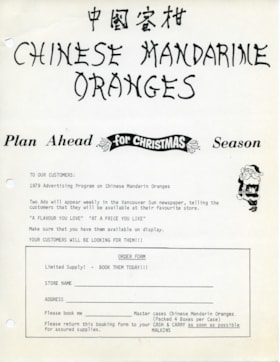
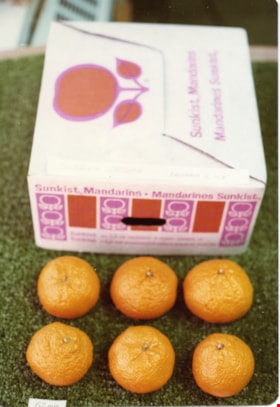
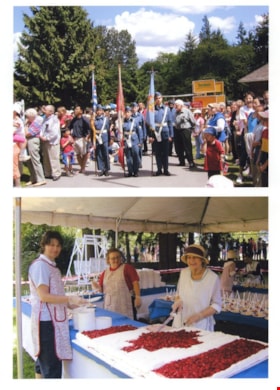
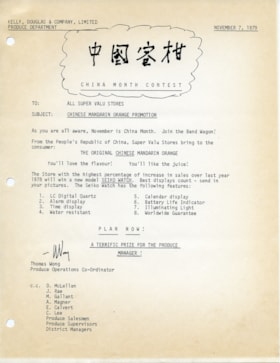
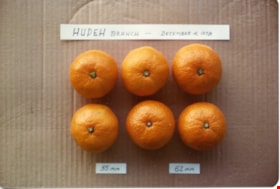
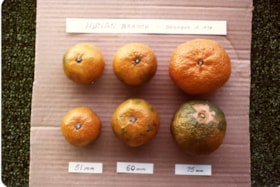
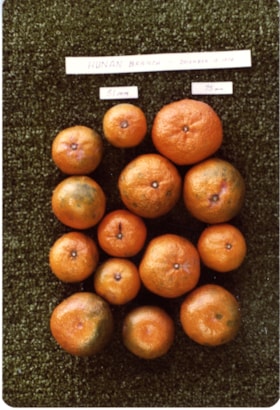
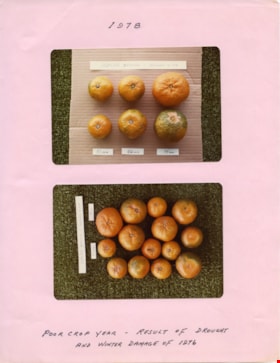

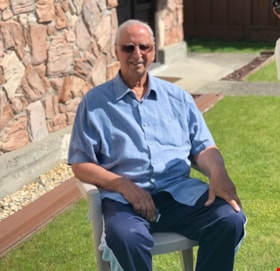
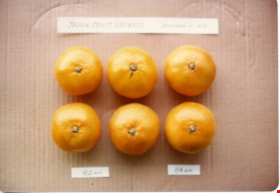
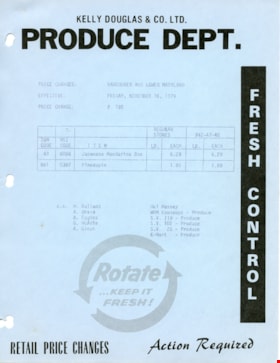
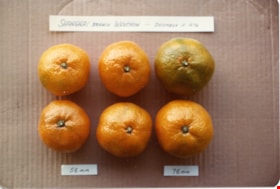
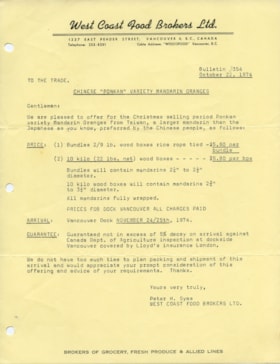

![Interview with Julie Lee by Denise Fong February 6, 2020, [1920-1992] (interview content), interviewed Feb. 6, 2020 thumbnail](/media/hpo/_Data/_BVM_Images/2017/2017_0024_0027_001.jpg?width=280)

